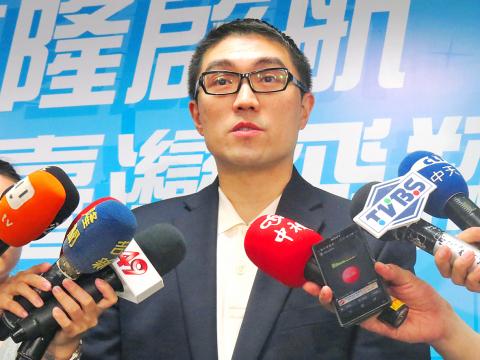Three-term Chinese Nationalist Party (KMT) Legislator Hsieh Kuo-liang (謝國樑) yesterday said he would not seek re-election, citing the results of the nine-in-one elections on Nov. 29 last year in Keelung.
“Since the KMT lost last year’s mayoral campaign, as someone who took on a heavy role in campaigning, I should not only humbly listen to the choice of city residents, but should also take appropriate responsibility and make good my promise,” Hsieh wrote in a Facebook post, referring to his promise not to seek re-election if KMT mayoral candidate Hsieh Li-kung (謝立功) lost.
Hsieh Kuo-liang said he would continue to help the KMT’s Keelung branch as a volunteer, leaving open the possibility for a campaign role in the next legislative election in January next year.

Photo: Yu Chao-fu, Taipei Times
Democratic Progressive Party (DPP) candidate Lin Yu-chang (林右昌) beat Hsieh Li-kung in the city, which had long been viewed as a KMT stronghold.
However, a corruption scandal that led to a split in the KMT camp, former Keelung city council speaker Huang Ching-tai (黃景泰) ran as an independent candidate after he was detained on suspicion of violating the Anti-Corruption Act (貪污治罪條例).
Lin won the mayor’s race with an increase of 10 percentage points over his previous campaign in 2012, when he ran against Hsieh Kuo-liang for Keelung’s single legislative seat.
Hsieh Kuo-liang’s announcement signals the end to a 10-year legislative career that saw him serve as the KMT caucus whip as well as cochairman of the Judiciary and Organic Laws and Statutes Committee.
Hsieh, who holds a master’s degree from the Massachusetts Institute of Technology and renounced his US citizenship to serve as a legislator, is the scion of a prominent Keelung political family.
The family also owns a number of businesses and schools such as the Sangong Group, the Second Credit Cooperative of Keelung and the Keelung Er Xin High School.
When he was first elected in 2004 on the People’s First Party’s (PFP) ticket, he became the youngest member of the legislature. He switched allegiance to the KMT in 2006.
DPP Keelung branch chairman Tsai Shih-ying (蔡適應) yesterday said that he will campaign for the party’s nomination for the seat. Lawyer Cheng Wen-ting (鄭文婷) announced her own candidacy for the nomination earlier this month.
Rumored pan-blue candidates include Hsieh Li-kung, KMT Legislator Hsu Shao-ping’s (徐少萍) son, Lin Pei-hsiang (林沛祥), and KMT Keelung City Councilor Han Liang-chi (韓良圻), as well as Liu Wen-hsiung (劉文雄) of the PFP, who represented the city in the Legislative Yuan for three consecutive terms.
Additional reporting by Yu Chao-fu

An essay competition jointly organized by a local writing society and a publisher affiliated with the Chinese Communist Party (CCP) might have contravened the Act Governing Relations Between the People of the Taiwan Area and the Mainland Area (臺灣地區與大陸地區人民關係條例), the Mainland Affairs Council (MAC) said on Thursday. “In this case, the partner organization is clearly an agency under the CCP’s Fujian Provincial Committee,” MAC Deputy Minister and spokesperson Liang Wen-chieh (梁文傑) said at a news briefing in Taipei. “It also involves bringing Taiwanese students to China with all-expenses-paid arrangements to attend award ceremonies and camps,” Liang said. Those two “characteristics” are typically sufficient

A magnitude 5.9 earthquake that struck about 33km off the coast of Hualien City was the "main shock" in a series of quakes in the area, with aftershocks expected over the next three days, the Central Weather Administration (CWA) said yesterday. Prior to the magnitude 5.9 quake shaking most of Taiwan at 6:53pm yesterday, six other earthquakes stronger than a magnitude of 4, starting with a magnitude 5.5 quake at 6:09pm, occurred in the area. CWA Seismological Center Director Wu Chien-fu (吳健富) confirmed that the quakes were all part of the same series and that the magnitude 5.5 temblor was

The brilliant blue waters, thick foliage and bucolic atmosphere on this seemingly idyllic archipelago deep in the Pacific Ocean belie the key role it now plays in a titanic geopolitical struggle. Palau is again on the front line as China, and the US and its allies prepare their forces in an intensifying contest for control over the Asia-Pacific region. The democratic nation of just 17,000 people hosts US-controlled airstrips and soon-to-be-completed radar installations that the US military describes as “critical” to monitoring vast swathes of water and airspace. It is also a key piece of the second island chain, a string of

The Central Weather Administration has issued a heat alert for southeastern Taiwan, warning of temperatures as high as 36°C today, while alerting some coastal areas of strong winds later in the day. Kaohsiung’s Neimen District (內門) and Pingtung County’s Neipu Township (內埔) are under an orange heat alert, which warns of temperatures as high as 36°C for three consecutive days, the CWA said, citing southwest winds. The heat would also extend to Tainan’s Nansi (楠西) and Yujing (玉井) districts, as well as Pingtung’s Gaoshu (高樹), Yanpu (鹽埔) and Majia (瑪家) townships, it said, forecasting highs of up to 36°C in those areas